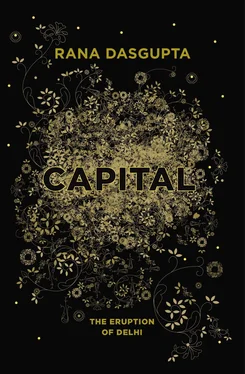Like many Delhi rich boys, Mickey was given a big wedding as a way of winding down his wild years. When he was twenty-two, he married his childhood sweetheart; their reception had 6,000 guests and featured dance routines by Bollywood divas. Mickey still loves parties and, as I discover during our conversation, he becomes relaxed and witty with alcohol, but there is no doubt that he has by now grown into a fully fledged partner to his father. He’s ready to shut down his club: he doesn’t have time to attend to it anymore, and he doesn’t want anyone else to run it. He operates five shopping malls across India, and he has another 1,400 acres under development. And that is just the beginning. He is moving on to much bigger plans.
“We’ve just leased 700,000 acres for seventy-five years; we’re opening up food processing, sugar and flower plantations.”
He is so matter-of-fact that I’m not sure if I’ve heard correctly. We have already discussed how laborious it is to acquire land in India, buying from farmers five or ten acres at a time. I can’t imagine where he could get hold of land on that scale.
“Where?” I ask.
“Ethiopia. My father has a friend who bought land from the Ethiopian president for a cattle ranch there. The president told him he had other land for sale. My dad said, ‘This is it, this is what we’ve been looking for, let’s go for it.’ We’re going in there with Boris Berezovsky. 51Africa is amazing. That’s where it’s at. You’re talking about numbers that can’t even fit into your mind yet. Reliance, Tata, all the big Indian corporations are setting up there, but we’re still ahead of the curve. I’m going to run this thing myself for the next eight years, that’s what I’ve decided. I’m not giving this to any CEO until it meets my vision. It’s going to be amazing. You should see this land: lush, green. Black soil, rivers.”
Mickey tells me how he has 100 farmers from Punjab ready with their passports to set off for Ethiopia as soon as all the papers are signed.
“Africans can’t do this work. Punjabi farmers are good because they’re used to farming big plots. They’re not scared of farming 5,000 acres. Meanwhile I’ll go there and set up polytechnics to train the Africans, so they’ll be ready when the sugar mills start up.”
Shipping farmers from Punjab to work on African plantations is a plan of imperial proportions. And there’s something imperial about the way he says ‘Africans’. I’m stunned. I tell him so.
“Thank you,” he says.
“What is on that land right now?” I ask, already knowing that his response, too, will be imperial.
“Nothing.”
Mickey is excited to be talking about this. His spirits seem to be entirely unaffected by the recession that currently dominates the headlines. He orders another beer, though we have exceeded his time. All of a sudden, I find him charismatic. I can see why he makes things happen: he has made me believe, as he must have made others believe, that he can do anything. I ask him how he learned to think like this.
“I’m only twenty-eight,” he says. “Why not?”
He becomes flamboyant.
“We’re going to be among the top five food processors in the world. You know the first company I’m going to buy? Heinz.”
I’m interested in his “Why not?” Is it on the strength of such throwaway reason that 700,000 acres of Ethiopia are cleared and hundreds of farmers shipped across the world? I wonder what the emotional register of this is for him. It seems as if, somewhere, it’s all a bit of a lark.
“I sometimes wonder why I work,” he says. “I do ask that question. I don’t need to work. But what else am I going to do? You can’t sit in beach resorts for 365 days a year. So I think of crazy things. I like it when you think up something, and it’s so wild you’re messed in the head and you think, ‘How can I do this?’ — and then you think, ‘Why not?’”
I feel like pointing out that life holds more possibilities for someone like him than just sitting on the beach. “Messed in the head” sounds like language that remains from his wild days, as if the whole thing is about getting a high. I ask him how he wants to spend his money.
“Currently I drive a BMW 750i. It’s good for long drives to the mall I’m building in Ludhiana. The car I really want is an Aston Martin DBS. But I’ll buy it later, when I deserve it more. My father wanted to buy me a nice sports car three years ago but I said, ‘Wait.’ I set myself certain goals. By the time I’m forty I want a 160-foot boat. I want a nice Gulfstream plane. And I want to be able to run them without it pinching me.”
Mickey talks as if he were saving up for a motorbike or a fridge, and it seems strangely banal. This is a man who can dream up earth-bending forms of money-making, but his ideas of spending it are consumerist in the most ordinary of ways. His middle-class vocabulary seems at odds with his multibillion-dollar scale, and I wonder if he is deferring his sports car so as not to run out of future acquisitions too quickly. I wonder if the whole enterprise does not teeter on the edge of senselessness, if he is not in fact still waiting for someone to supply him with a meaning for this money around which his life is organised.
Unprompted, he becomes philosophical.
“I’m not religious. I’m spiritual. My basic principle is: Whatever goes around comes around. It will come back to you, you can be dead sure of that. I live my life in a Vedic way. Disciplined. No idol worship, no stupid acceptance. Also that you don’t just let someone hit you and take it from them. You give it back to them.”
I’m not sure if this last point flows from the basic principle, but I don’t question it. Mickey is deadly serious. He is letting me in on his knowledge. He tells me a story.
“I was at a party recently, and the waiter was handing out drinks and he moved the tray away a little too soon and this guy hadn’t got his drink. So the guy shook up a soda bottle and sprayed it in the waiter’s face. I went straight to the host, and I had him chucked out of the party. You have to know how to behave. Some people only feel they have money when they can screw someone else. You have to know how to treat normal people. You see, there are two kinds of rich. There are people who’ve had money for a long time and they don’t give a fuck who you are: they’ll be nice to you anyway. Like I’m nice to people. You may get bored being around them because all they talk about is how they’ve just got back from Cannes or St Tropez, but they will always be nice. But the people who’ve got rich in the last five years, they turn up at a party and the first thing they do is put their car keys down on the table to show they have a Bentley. They don’t know how to behave.”
Mickey is a little drunk, and he’s policing boundaries that are clearer to him than to me. It’s not the first time he’s said, ‘People have to know how to behave.’ Once again I feel that his stand against the nihilism of the Delhi rich is all the more fervent because he is assailed by it himself. He is intimate with all the thuggish bad boys who have given people like him such a bad name, and he is impressed by parables of restraint.
“I have a friend who’s a multibillionaire,” he says, “and I asked him about the best car to buy for your kids, because I’ve just had kids, and he suggested a Toyota Innova. He could afford to buy a jet for his kids but he doesn’t. They have to earn it. He just buys them an Innova. You see, people say there are bad kids but it’s all the parents’ fault. It’s totally the parents. They have fucked up their kids and once that’s happened it can never be undone. One day the guy is driving a Maruti 800, the next day he’s driving an S Class, and he buys Beamers for his kids when they’re ten years old and they just go crazy. The kids get fucked up.”
Читать дальше











